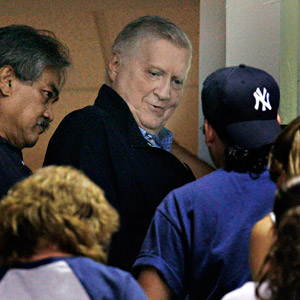The Boss' legacy bigger than The Babe's
George Steinbrenner picked up the phone, and it was good to hear the sound of his voice. Not many people have ever made that claim -- happy to hear from Steinbrenner, that is -- but this would be the last roar from the loudest lion.
The last night The Boss was really The Boss.
He was in declining health in the fall of 2007, and his team was in a declining state in the American League Division Series. Steinbrenner hated losing to his hometown team, the Cleveland Indians, so a call was placed to his suite at the Regency to see if the owner of the New York Yankees could summon one final blast from his past.
"His job is on the line," Steinbrenner said of Joe Torre. "I think we're paying him a lot of money. He's the highest-paid manager in baseball, so I don't think we'd take him back if we don't win this series."
[+] Enlarge

AP Photo/Chris O'MearaGeorge Steinbrenner won seven World Series titles with the Yankees.
"I have full control," he said.
Born on the Fourth of July, dead nine days after his 80th birthday, George Steinbrenner controlled his team like no owner in the history of American sports. He was the shipbuilder who became bigger than the ship. He was the Yankee who became bigger than the Mick and the Clipper and the Babe.
That's his legacy: A rich kid from Cleveland -- desperate to win the approval of a cold and distant father, desperate to be a titan in the most iconic city -- ended up larger in life than the sluggers who defined Yankees mythology.
Steinbrenner didn't need "Seinfeld" to become America's boss. He was already famous for demanding perfection in others despite his own outlandish imperfections, for berating and terminating employees faster than he could apologize and hire them back.
He was a living, breathing dichotomy -- an owner who could bask in Bucky Dent's indelible home run in Fenway Park in 1978, and then be sure to fire Dent at Fenway a dozen years later. Steinbrenner could gracelessly nudge Don Mattingly toward retirement, but console him at his Kingdome locker after Mattingly lost the one and only playoff series of his career.
In 1996, Steinbrenner could celebrate his first championship in 18 years, and then obliterate a staff member minutes before the Canyon of Heroes parade for allowing the players' wives to ride on the players' floats.
Steinbrenner won seven World Series titles and established himself as the founding father of free agency. He spent billions in pursuit of athletic glory, and got himself suspended for giving money to a United States President (illegal campaign contributions to Richard Nixon) and to a two-bit gambler (digging-up-dirt contributions to Howie Spira).
There's a reason why there was nothing more limited than being The Boss' limited partner.
"George Steinbrenner is the Yankees," his general manager, Brian Cashman, once said. "It's impossible to imagine this team without George Steinbrenner owning it."
The Boss nearly cashed out in talks with Cablevision in 1998, and walked away from the deal when he realized nobody sells the franchise he called the Mona Lisa, certainly not George Steinbrenner.
He loved being the biggest winner in the biggest city. When the Yankees faced the Mets in the 2000 World Series, Steinbrenner put everyone on notice like never before.
"From a company standpoint, the city was ours," Cashman said.
"The Boss told me, 'You'd better win or else.' I felt like if we lost to the Mets, it would've diminished our three championships. It would've been like they didn't count. I was always proud of what we'd done, and I'd never before been scared of losing. But I was scared of losing to the Mets."
Steinbrenner thrived on fear. As a former assistant football coach in the Big Ten, he was on a constant search for tackling dummies and a reason to create a fourth-and-1 cloud of dust.
On June 15, 2005, it first became clear Steinbrenner was approaching his final goal-line stand. At a news conference called to unveil the plans for a new Yankee Stadium, someone asked The Boss if the new park would offer Rodriguez a friendly left-field target.
"A-Rod doesn't need any help," Steinbrenner said, "but I don't think the Yankees did right by Babe Ruth when he was here. They should've been better to him. We'll be better to A-Rod when he gets ready to retire."
Reporters and Yankees officials shot each other the oddest of looks. When the news conference ended, one team official whispered, "He's not what he used to be, is he?"
Slowly, surely, Steinbrenner faded from public view as the vile forces of nature and age conspired against him. He'd chased everyone from Catfish Hunter to Roger Clemens, even pumping iron with Clemens on a visit to the Rocket's home.
All of that free-agent recruiting, all of that bickering with Billy and Reggie, all of that back-and-forth with Yogi -- the sights and sounds make for a fascinating portrait of a complicated life.
George Steinbrenner touched them all before dying Tuesday morning with a singular legacy.
Without ever stepping to the plate, the Boss became bigger than the Babe.
Ian O'Connor is a columnist for ESPNNewYork.com. You can follow him on Twitter.



No comments:
Post a Comment